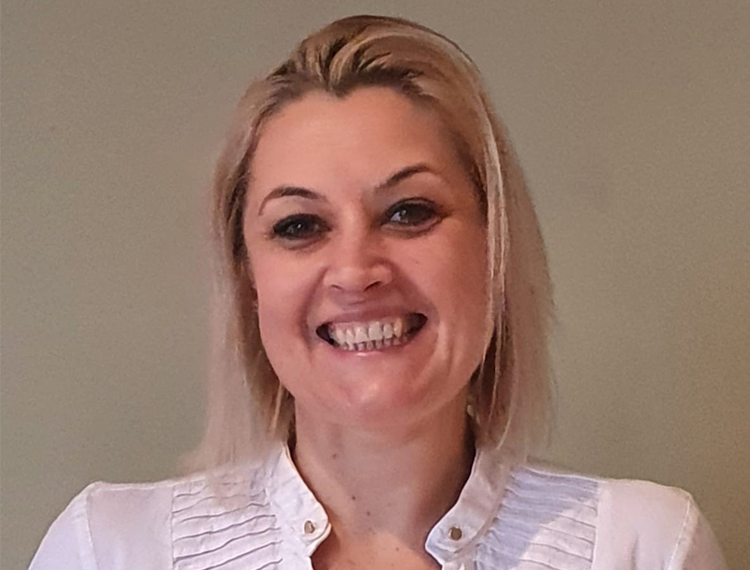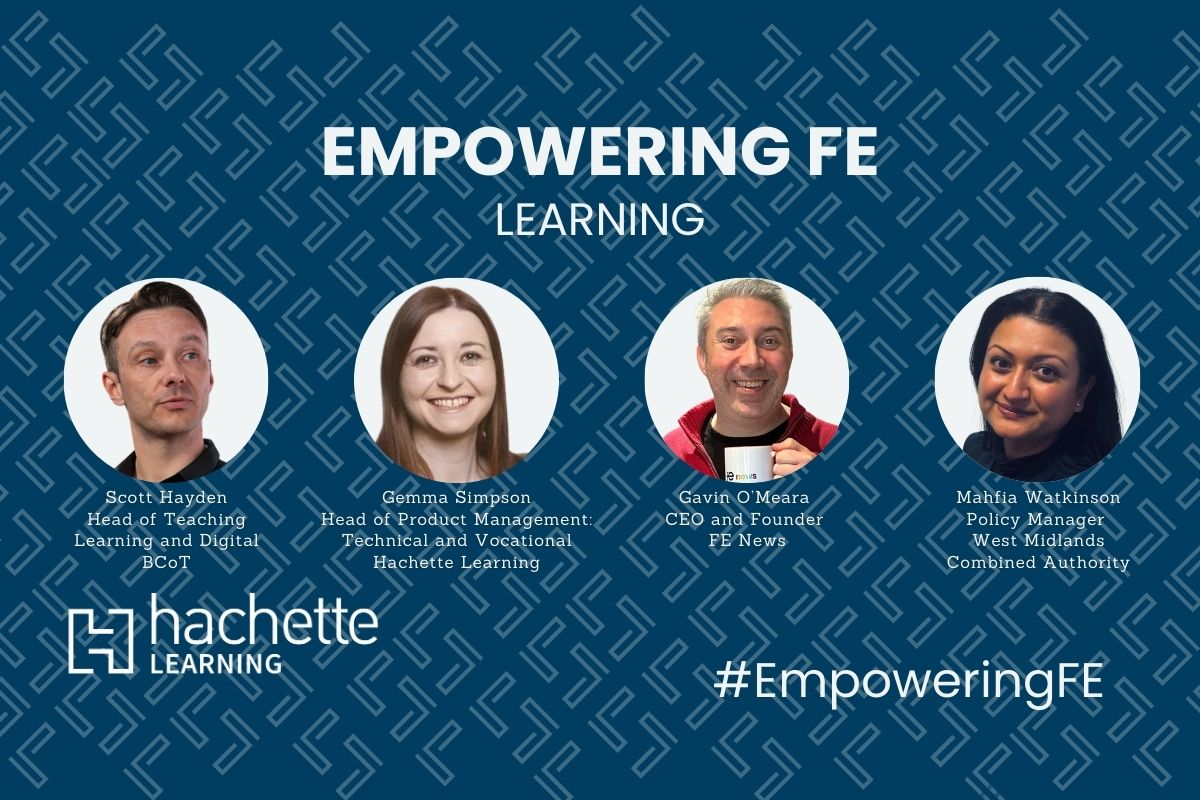Reasonable adjustments: positive conversations show that awareness and support for learners with various needs is growing

Scrolling through FE News, you may have come across our adverts for The Reasonable Adjustments Series and I wanted to share some of the conversations I’ve been hosting with our brilliant industry experts.
It’s been incredible to be a part of these discussions.
Improving learner support and addressing the barriers that many learners face in education all starts with open and honest conversations.
Breaking down the stigma around learning difficulties and disabilities, so apprentices feel more confident to self-disclose their support needs is vital. Where employers and independent training providers work together to create a joined-up approach and ensure the best support is given to each individual in learning and work.
The collective input from our panellists and audience members shows a huge amount of growing awareness and willingness for the whole industry to adapt, which has also been reflected in the sector’s response.
So far in the series, I’ve welcomed:
Stewart Segal – former AELP CEO and current Chair of Youth Employment UK
Charlotte Bosworth – Managing Director at Innovate Awarding
Carl Harper – EPA Manager at Inspire Learning & Employment
Karen Bennett – Senior Policy Lead at the Education & Skills Funding Agency (ESFA)
Tina Bhambhra – Senior Assessment and Quality Manager at The Institute for Apprenticeships & Technical Education (IfATE)
Navila Amin – Senior Talent Development Partner at BT Group
Chris Quickfall – Founder and CEO at Cognassist
And in our next and final panel on 10th December, I will be talking with:
Helen Bramley – Educational Consultant, who has years of experience with inspections around measuring outcomes.
Aaron Crudge – Assessment Operations & Exam Center Manager at WhiteHat Group, and a former apprentice who experienced reasonable adjustments first-hand.
Be sure to register to hear from Aaron and other learners who experienced the transformative impact of reasonable adjustments.
I hope you can join the discussion on how to improve outcomes with reasonable adjustments, with common pitfalls to avoid and best practise tips.
Sign up here!
To tempt you further, here are just some of the highlights and feedback from our previous panels.
Enjoy…
The Reasonable Adjustments Series #1: Implementation
Why do you think there is such a problem within the industry where organisations just aren’t addressing this issue when it comes to reasonable adjustments?
Charlotte: I quite often think – How do we actually get people not to assume and recognise the diversity of apprentices and learners?
I think it goes across all levels and ensures that when things are developed and considered from the outset, that there are reforms.
That actually, the consideration for the diversity of learners is included in that thought process and that development process.
Stewart: I would absolutely agree.
And frankly, not being unkind, but most providers tend then to structure their programmes around the rules. And because the rules are not very clear on reasonable adjustments, they can sometimes get forgotten.
I don’t think it’s a matter of people not caring or not wanting to do it. It’s a pretty tough, complex sector.
And anything that sort of complicates the day to day, I think that is tough for training providers to deal with.
It’s about changing that round and making reasonable adjustments as a way of managing the complexity. Not as an addition to the complexity.
That’s where we’ve never got to.
We’ve never got to that point and it’s always seen as a bit of a complication.
As it is seen that way by those that set the rules, the ESFA and the government.
I don’t think they’ve ever seen that adjusting to disabilities, changes and differences is a better way of delivering it than trying to structure it very closely.
Watch the first panel on demand now
The Reasonable Adjustments Series #2: Compliance
Do you think there could be more consistency around what good evidencing looks like?
Tina: I think it’s important that we realise first of all that it’s a collaborative effort towards building consistency around what good evidence should look like.
It’s everybody, right from the training provider to the EPAO. It’s not just one party that can bring that.
Sharing good practice would build towards that, sharing suggestions, ideas of how things are being done in compiling the evidence together would work really well for something like that.
Karen: One of the immediate things that sprung to mind when you talked about that is around the fact that every situation is different.
Every case is different so we will learn about this. It’s a learning journey.
It is a collaborative approach.
What I would be encouraging everybody to be doing, all stakeholders, is to be learning. Saying, “Ok, we’ve gone through this case, we’ve gone through this reasonable adjustment, what have we learned?”
Maybe this is something we should be talking about more. What works, what didn’t work. What could we have done differently?
Not being afraid to talk about what we could have done differently and share our learning as well.
Watch the second panel on demand now
The Reasonable Adjustments Series #3: Execution
Do you have any best practice advice in terms of having those conversations with learners in the workplace?
Navila: I think that’s the biggest piece of advice, it’s around equipping your line managers to have the right conversations.
Can they actually identify and know if the individual has a learning difficulty? Spotting that can be quite difficult if you’ve not worked in that area before to understand that someone might have slightly different needs.
I think seasoned line managers or someone who knows what to look out for that always really helps.
We definitely have loads of support in place for managers and individuals to help them put things in place, whether it’s mental health assistance, financial wellbeing or a physical disability.
We even have passports, and this is a great one that other organisations should definitely think about. We call it a BT Passport.
This is where an individual will have a conversation with their line manager, and it could be about mental health disability, a physical disability, it could be that you have caring responsibilities, for instance. But it’s a document that only you and your line manager can see, you complete it together and you review every so often.
In there is the detail around what is the disability, what are the responsibilities that you have got. It’s important to regularly review that and ensure that the adjustments are made for you as an individual and you’re getting all the right support that you need.
It makes that a very live document, so you can always refer back to it and it’s something that we always suggest and recommend that it’s picked up in one-to-ones. Even if you don’t do it every week, on a monthly basis that document is reviewed.
I think that’s quite helpful.
Stewart: it’s great to hear from BT. That sounds like a fantastic idea, but there is an issue I’ve experienced where people tend to do all of the analysis up front.
Certainly for apprentices who are starting an apprenticeship, you know what it’s like – they may not self-declare, they’re slightly nervous about their new business, they’re certainly nervous about new team.
So I think it’s a useful one for training providers to do at maybe when their halfway through the programme, and most training providers don’t do that.
They’ve done the analysis and made their judgement as best they can, and that tends to go throughout the whole programme.
I think there is something around making sure we’re picking that up, and certainly by the time you get round to assessment. I think that is when a lot of people suddenly realise they perhaps have an issue that they’re even more worried about because it’s not been declared.
Charlotte: This is where I feel that we need to make sure that providers, and the trainers in particular, who have that closest relationship with apprentices, have that clear line of sight of where they can feed into the right teams to be able to share any concerns and changes that they see the learners have.
Navila: I think the biggest thing for me, when it comes to an apprenticeship is if it’s an external training provider that we are working with is that relationship between the coach from the training provider and the line manager as well.
That tri-party relationship with the learner because those are so important to ensure that they’re having the right conversations at the right times. If the line manager has seen something that they are feeding that to the coach. And if the coach has seen something, they’re feeding that the line manager.
I think those conversations are so key throughout, so having those on a regular basis as well.
It’s something that we’re really passionate about and make sure that when we are talking to our training providers, if we are not the training provider ourselves, that that’s in place because that relationship is so key not just for learning but absolutely for all of those things on the periphery as well that will impact the learner.
Charlotte: I think we do need to get better at equipping trainers.
There’s quite a lot of pressure on trainers to get people through to complete and do a number of different things.
How do we better equip trainers and providers to be able to pick up when people’s needs are changing? It’s a skill in its own right to be able to identify those challenges and tease those out of learners.
Watch the third panel on demand now
This whole series has shown me that together we can do more to grow a supportive and open culture in the sector. One that seeks to embrace differences and has the in-built flexibility to help all individuals to thrive in the workplace.
The feedback from our conversations has been wonderful and really encouraging:
“To listen to these meetings and see that there are more people with positive thinking about reasonable adjustment and understanding of barriers to learning, is uplifting. Thank you.”
“Thank you for showing how reasonable adjustment can be approached and managed with the right conversations.”
“This was such valuable advice. Thank you so much, looking forward to the next one.”
“Great to get insight from a big employer on reasonable adjustments and see what it looks like when they are engaged and they ‘buy in’ to it. Thank you.”
Don’t forget to sign up for the next live event on 10th December all about Outcomes. It’s our celebration of what can happen when it all goes right.
For the first time in the series, we’ll also be sharing our handbook full of reasonable adjustments examples to all listeners. Hope to see you there!
Louise Karwowski – Head of Science at Cognassist











Responses